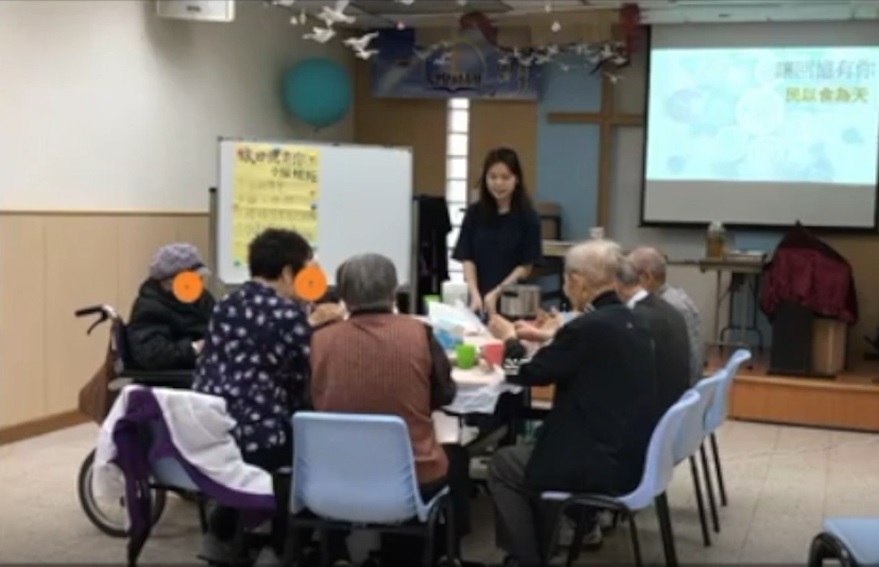The Discovery-enriched Curriculum (DEC), which emphasises discovery, innovation, and creativity, is at the core of City University’s academic strategy. The teachers at the University, those of CLASS’ various academic units included, are making these qualities the focus in their course delivery.
With the guidance of these passionate teachers, CLASS students have conducted a number of problem-focused researches over the years that DEC is being implemented. To honour the most outstanding ones, the College has established the DEC Award and given out prizes every year. In 2019, the champion and runner-up go to Social Work undergraduate Sylvia CHAN Ho-lam and Linguistics and Language Applications undergraduate Irene TSOI Ching-yin respectively.
 Photo 1: Sylvia organised a socialisation group with six gatherings, where the elderly can share past experience and happy memories together.
Photo 1: Sylvia organised a socialisation group with six gatherings, where the elderly can share past experience and happy memories together.
In Sylvia Chan’s research “Integration of Reminiscence Therapy and Positive Psychology for Single Elderly with Negative Thinking”, conducted under the supervision of Dr Sylvia KWOK LAI Yuk-ching, the winning student tried to deal with a phenomenon that she witnessed during her placement – the pessimism of single elderly. After carefully defined the target study group (aged 65 or above) and analysed the problems (the ageing trend of the Hong Kong population, the needs of the elderly, the pros and cons of possible solutions), she organised a socialisation group for single elderly with minimal support from the community, putting her knowledge in reminiscence therapy and positive psychology into application.
 Photo 2: Video clips featuring celebrities, workers, entertainment, and the living conditions of old Hong Kong were shown to the elderly.
Photo 2: Video clips featuring celebrities, workers, entertainment, and the living conditions of old Hong Kong were shown to the elderly.
The group members gathered once every week for six weeks. The gatherings surrounded six themes namely happy moments, childhood, career, family, food and hope, and consisted of an array of fun activities such as showing video clips of Hong Kong and celebrities in the participants’ golden years, roleplaying the workers in their past workplaces, and enjoying games they used to play in childhood like throwing beanbags, Mikado sticks, string figure and soft drink lids. All activities were designed to help participants recall happy memories, as well as develop peer connection. Both qualitative and quantitative evaluation were conducted throughout the programme, and the result shows that the participants are able to accept their past and affirm the value of their lives. The average scores for the Satisfaction with Life Scale, the Subjective Happiness Scale, and the Adult Dispositional Hope Scale assessments all increased. Sylvia concludes that single elderly with negative thinking could become more optimistic with effective intervention and empowerment, and they can further impact people around them.
Also inspired by observations in her everyday life, Irene’s idea to investigate speech production of the hearing-impaired speakers has been planted since she was in the secondary school, where a classmate of her wore hearing aids. In her research “An Acoustic Analysis of Cantonese Vowels and Tones Produced by Hearing-impaired Speakers”, supervised by Dr LEE Wai-sum, Irene wanted to find out whether the hearing-impaired speakers can produce Cantonese vowels and tones distinctively just like the normal hearing speakers. She invited eight Hong Kong Cantonese speakers, six of whom have severe to profound hearing loss and the other two have normal hearing ability, to utter 32 Cantonese monosyllabic words. The sounds were recorded and analysed using software. The analysis reflects that people with hearing impairment are less successful in differentiating and producing the tones than the vowels, in particular, they tend to flatten the contour tones.
According to Irene, the project provides the very first set of experimental data on the production of Cantonese vowels and tones by adult speakers with hearing impairment, shedding light on the effect of hearing impairment on speech development, and making available speech data on Cantonese vowels and tones for cross-language comparisons and generalisation. It provides speech therapists in Hong Kong with useful information on the nature of deficiency in speech production due to hearing impairment.
A big congratulations to Sylvia and Irene – for winning the award that they deserve, as well as their achievements in utilising what they have learnt to address social issues.
To learn more aboutSylvia and Irene’s discoveries and DEC learning outcomes, check out thefollowing videos as follows:
Sylvia Chan’s project
Irene Tsoi’s project
